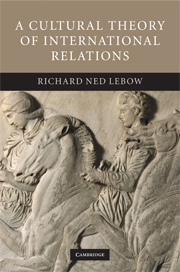Book contents
- Frontmatter
- Contents
- List of figures and tables
- Acknowledgments
- 1 Introduction
- 2 Fear, interest and honor
- 3 The spirit and its expression
- 4 The ancient world
- 5 Medieval Europe
- 6 From Sun King to Revolution
- 7 Imperialism and World War I
- 8 World War II
- 9 Hitler to Bush and beyond
- 10 General findings and conclusions
- Bibliography
- Index
10 - General findings and conclusions
Published online by Cambridge University Press: 03 July 2009
- Frontmatter
- Contents
- List of figures and tables
- Acknowledgments
- 1 Introduction
- 2 Fear, interest and honor
- 3 The spirit and its expression
- 4 The ancient world
- 5 Medieval Europe
- 6 From Sun King to Revolution
- 7 Imperialism and World War I
- 8 World War II
- 9 Hitler to Bush and beyond
- 10 General findings and conclusions
- Bibliography
- Index
Summary
Troia (nefas!) commune sepulcrum Asiae Europaeque
Troia virum et virtutum omnium acerba cinis …
Troy – the horror! – common grave of Asia and Europe,
Troy, cruel tomb of all heroes and heroism …
CatullusThis book develops a framework for the study of politics and derives from it a theory of international relations. I elaborate only part of this theory in detail – that having to do with the spirit – because it is the motive more or less ignored by political science. I posit three fundamental motives that reflect universal human needs – appetite, spirit and reason – and a fourth – fear – that grows in importance in proportion to the failure of reason to constrain appetite or spirit. Each motive has an associated “logic” that prompts specific approaches to cooperation, conflict and risk-taking. Appetite, spirit and reason have the potential to generate orders, each associated with a different form of hierarchy and principle of justice, or a combination of principles in the case of reason. Fear can also produce order, but as Aristotle, Hobbes and Weber recognize, it is likely to be short-lived if it is not associated with some principle of justice that brings about a high voluntary degree of compliance.
My theory is dynamic because it accepts change as the norm, defined as movement away from rather than towards any postulated equilibrium.
- Type
- Chapter
- Information
- A Cultural Theory of International Relations , pp. 505 - 570Publisher: Cambridge University PressPrint publication year: 2008



